|
|
|
Sort Order |
|
|
|
Items / Page
|
|
|
|
|
|
|
| Srl | Item |
| 1 |
ID:
101168
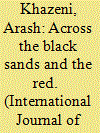

|
|
|
|
|
| Publication |
2010.
|
| Summary/Abstract |
Through a reading of 19th-century Persian travel narratives, this article locates the history of Iran and Central Eurasia within recent literature on global frontier processes and the encounter between empire and nature. It argues that Persianate travel books about Central Eurasia were part of the imperial project to order and reclaim the natural world and were forged through the material encounter with the steppes. Far from a passive act of collecting information and more than merely an extension of the observer's preconceptions, description was essential to the expansion and preservation of empire. Although there exists a vast literature on Western geographical and ethnographic representations of the Middle East, only recently have scholars begun to mine contacts that took place outside of a Western colonial framework and within an Asian setting. Based on an analysis of Riza Quli Khan Hidayat's Sifaratnama-yi Khvarazm, the record of an expedition sent from the Qajar Dynasty to the Oxus River in 1851, the article explores the 19th-century Muslim "discovery" of the Eurasian steppe world. The expedition set out to define imperial boundaries and to reclaim the desert, but along the way it found a permeable "middle ground" between empires, marked by transfrontier and cross-cultural exchanges.
|
|
|
|
|
|
|
|
|
|
|
|
|
|
|
|
| 2 |
ID:
190993
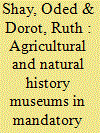

|
|
|
|
|
| Summary/Abstract |
The establishment of agricultural and natural history museums in Jerusalem (1920) and Tel Aviv (1925) by individual and institutional Jewish entrepreneurs was a corollary of the wave of exhibitions and fairs in Western countries that swept across Mandatory Palestine’s Jewish community (Yishuv) in the 1920s. Yet it also reflected Zionist ideals and perceptions and as such served as a catalyst for providing modern agricultural education to the Yishuv’s urban classes.
|
|
|
|
|
|
|
|
|
|
|
|
|
|
|
|
| 3 |
ID:
108660
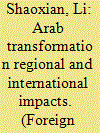

|
|
|
| 4 |
ID:
174715
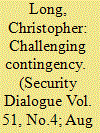

|
|
|
|
|
| Summary/Abstract |
Understandings of the nature or inherent workings of molecular life in the field of biopolitical security studies have today been characterized predominantly in terms of contingency. This article challenges this characterization. It does so by identifying a particular logic of operation that organizes political action and intervention at both the level of the population and the molecular in response to the threats of smallpox, Ebola and pandemic influenza. It argues that, in fact, rather than securing by instantiating a general economy of the contingent, governing practices rely upon the characterization of the nature of molecular life in terms of its constant biological dynamics. Governments around the world, and the US government in particular, have reacted to the increased likelihood of the emergence of disease through the stockpiling of new pharmaceuticals, including the antivirals ST-246, ZMapp and Tamiflu. Antivirals represent a pharmaceutical tool stockpiled by governments to ensure that they can respond to the emergence of novel biological threats. The characterization of the nature of molecular life in terms of its constant biological dynamics is so important, then, as it is this that underpins political programmes of preparedness that utilize antivirals in the prevention of disease.
|
|
|
|
|
|
|
|
|
|
|
|
|
|
|
|
| 5 |
ID:
105336
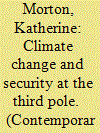

|
|
|
|
|
| Publication |
2011.
|
| Summary/Abstract |
The consequences of global climate change present a serious strategic challenge in one of the most remote parts of the world. The Tibetan Plateau is the largest high-altitude landmass on earth, with more than 45,000 glaciers that feed the major river systems in Asia, which, in turn, support 40 per cent of the world's population. Temperatures in the region are rising twice as fast as the global average, posing serious risks to hydrological systems, agriculture, and critical infrastructure. Looking at regional cooperation through the lens of ecological security raises important questions about the extent to which the threat of large-scale climate-related disaster could trigger new forms of cooperative action. The sobering reality is that current responses fall far short of ensuring a mutually secure future.
|
|
|
|
|
|
|
|
|
|
|
|
|
|
|
|
| 6 |
ID:
122831
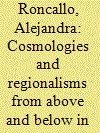

|
|
|
|
|
| Publication |
2013.
|
| Summary/Abstract |
Drawing on a Polanyian analysis of the land question, this article aims to analyse both Western and Indigenous cosmologies of Abya Yala-the name that indigenous peoples give to the American continent-to understand the relationship between human beings and land and nature. These cosmologies are at the heart of the way in which two distinct societies construct their regional space, one from 'above', the other from 'below', and they are therefore key to understanding today's climate change problématique. Following this nexus it is argued that, since the end of the Cold War, a new regional 'double-movement', unleashed by the quest for land and natural resources has been in the making. This is a superstructural or legal battle between Western transnational regime-making and a law that originated at the 'centre of the Earth'. The article explains both regionalisms and the dialectical interaction between them and demonstrates that Karl Polanyi's legacy remains relevant for the 21st century.
|
|
|
|
|
|
|
|
|
|
|
|
|
|
|
|
| 7 |
ID:
090757
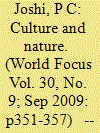

|
|
|
| 8 |
ID:
108288


|
|
|
| 9 |
ID:
106746
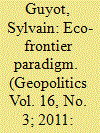

|
|
|
|
|
| Publication |
2011.
|
| Summary/Abstract |
There is a gap in the geographical/geopolitical literature about the process that motivates humans to conquer a boundless, timeless and invaluable wilderness in the name of plural ecologies to serve their own political interests in control and territory building by means of 'green gerrymandering'. The ecological frontier (or eco-frontier), a neologism produced by a contemporary greened civil society, can be considered a new paradigm that embraces the mental representations and spatial constructions of eco-conquest without restricting its temporal dimension to the present time. Indeed, the eco-frontier is a genealogical paradigm where new dynamics always revisit old processes. The creation and use of the eco-frontier can illuminate the history of the global territorialisation of nature in the last three centuries. From a spatial point of view, two main understandings of the eco-frontier exist. The first characterises virtual and mental imageries of natural spaces of eco-conquest that are strongly associated with Westernised representations of nature. The second considers eco-frontiers as geographical processes to understand the green dynamics of territorial appropriation and re-conquest. As a genealogical paradigm, the eco-frontier has a specific temporal dynamic that integrates the different historical contexts and political ideologies of nature. Three generations of eco-frontiers (Empire, Geopolitical and Global generations) began at different times and co-exist today, with superposition and percolation. This empirical study shows how contemporary environmentalists and green stakeholders produce specific discourses and representations on global eco-frontiers. The paper focuses on the current territorial domination carried out by contemporary eco-conquerors creating possible new geopolitics.
|
|
|
|
|
|
|
|
|
|
|
|
|
|
|
|
| 10 |
ID:
101421
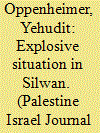

|
|
|
| 11 |
ID:
126853
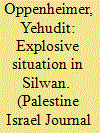

|
|
|
|
|
| Publication |
2011.
|
| Summary/Abstract |
If there is one area in the country where state control should develop, plan, manage and preserve, it is this area of the historic City of David." That is what the Israeli Antiquities Authority wrote in a letter to the attorney general. And they were not alone in this opinion. The City of David is located a few dozen meters from the Temple Mount, in the heart of the crowded Palestinian neighborhood of Silwan
|
|
|
|
|
|
|
|
|
|
|
|
|
|
|
|
| 12 |
ID:
108750
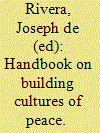

|
|
|
|
|
| Publication |
Worcester, USA, Springer, 2009.
|
| Description |
xviii, 407p.
|
| Series |
Peace psychology book series edited by Christie, Daniel J
|
| Standard Number |
978038795745, hbk
|
|
|
|
|
|
|
|
|
|
|
|
Copies: C:1/I:0,R:0,Q:0
Circulation
| Accession# | Call# | Current Location | Status | Policy | Location |
| 056396 | 303.6/RIV 056396 | Main | On Shelf | General | |
|
|
|
|
| 13 |
ID:
095433
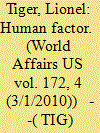

|
|
|
|
|
| Publication |
2010.
|
| Summary/Abstract |
It's hardly surprising that a sentient species such as ours would be attentive to its immediate environment. Nor is the extension of that immediacy to the planet overall difficult to understand: mankind has always been interested in nature for both practical and aesthetic reasons. It follows that the broad effort toward scientific explanation of the impact of people and systems on nature has supported what has become a global environmental movement, at least conceptually. And not only conceptually, because there have been repeated gatherings of concerned leaders intent on responding to current and future problems associated with environmental impact, such as warming trends and sea levels. Perhaps not since the Communist International has there been such a self-conscious and comprehensive effort to accomplish large-scale goals.
|
|
|
|
|
|
|
|
|
|
|
|
|
|
|
|
| 14 |
ID:
099001
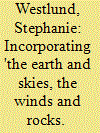

|
|
|
|
|
| Publication |
2010.
|
| Summary/Abstract |
Scholars often re-tell and analyze peacebuilding stories as independent of locale, as though place does not matter. Inspired by a Mayan priest's observation that academic peacebuilding frameworks are missing 'the earth and skies, the winds and rocks', this article examines the role of nature in conflict transformation and peacebuilding. It reviews the results of studies highlighting nature's function in human evolution and in improving mental health and well-being. It then presents three case studies of peacebuilding processes in which participants interacted with one another in natural settings. When these cases are taken at the convergence of the empirical research on nature's emotional and physiological benefits to human beings, a meaningful pattern emerges. Each case becomes understood as tied to the ecologies of the place where participants engaged with one another, thus suggesting that nature is an active yet overlooked participant in conflict transformation and peacebuilding.
|
|
|
|
|
|
|
|
|
|
|
|
|
|
|
|
| 15 |
ID:
141775
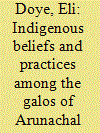

|
|
|
|
|
| Summary/Abstract |
This fieldwork-based article provides an ethnographic overview of surviving traditional ritual practices and underlying belief systems among the Galos of Arunachal Pradesh. Since most of this community recently converted to Christianity, many of the details outlined here may soon be forgotten and no longer practised, or will be only used when other patterns of recourse to remedies for distress have shown no results. The evidence presented indicates the continued presence of ancient holistic worldviews that may be dismissed by others as ‘primitive’ but whose followers seek to fall in line and clearly connect themselves with locally grounded forces beyond immediate human control.
|
|
|
|
|
|
|
|
|
|
|
|
|
|
|
|
| 16 |
ID:
117869
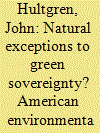

|
|
|
|
|
| Publication |
2012.
|
| Summary/Abstract |
Rather than making any general claims supporting or opposing the "greening" of sovereignty, this article examines the variable discourses through which the ethos of ecosovereignty is reconfigured. The questions that drive this inquiry are (1) through what discursive pathways do conceptions of nature, political community, and governance intersect to constitute exclusionary ethoses of ecosovereignty? and (2) how might alternative articulations challenge such exclusions? These questions are pursued by examining the contemporary American "environmental restrictionist" (immigration-reduction environmentalist) movement, and critical responses to the movement. It traces how nature, political community, and governance are conceptualized and related to one another in efforts to bolster alternative configurations of ecosovereignty. By gaining insight into the various discourses through which iterations of ecosovereignty emerge, scholars and practitioners might better respond to the multiplicity of ways that nature becomes enmeshed in exclusionary social forms.
|
|
|
|
|
|
|
|
|
|
|
|
|
|
|
|
| 17 |
ID:
124529
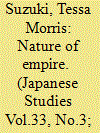

|
|
|
|
|
| Publication |
2013.
|
| Summary/Abstract |
Over the past quarter of a century, research on the connection between empire and environment has flourished worldwide. Most writings, though, have focused on the history of European empire-building or American westward expansion; few have anything significant to say about the Japanese empire. The present essay aims to address this lacuna by exploring interrelated changes to the forest landscape in imperial Japan's colonies of Korea, Taiwan and Karafuto and in peripheral areas of 'Japan proper' (naichi). This exploration provides a basis for addressing the questions: How might our images of the Japanese imperial expansion be challenged if we consider its history from the vantage point of forests? What light does the natural and cultural history of forests in the Japanese empire shed on wider debates about imperialism, environmentalism and modernity?
|
|
|
|
|
|
|
|
|
|
|
|
|
|
|
|
| 18 |
ID:
193467
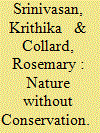

|
|
|
|
|
| Summary/Abstract |
The predominant approach of protecting or restoring floral and faunal life after harming, displacing, or destroying them in service of human interests does not hold much promise for nature on Earth in the age of the Anthropocene. Such approaches fail to address the ethical and political-economic cores of what tend to be presented as techno-scientific or ecological problems. If the planet is to remain home to life beyond the human, mainstream human societies need to rethink their place, role, and entitlements on Earth, and relearn to cohabit with human and nonhuman others, even in the face of risk and uncertainty.
|
|
|
|
|
|
|
|
|
|
|
|
|
|
|
|
| 19 |
ID:
188747
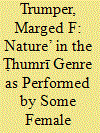

|
|
|
|
|
| Summary/Abstract |
I discuss the treatment of the theme of nature in ṭhumrī by some female exponents of the Pūrab Aṅg (eastern style) in the various contexts where these artists were and are active, especially in the phase of transition from the style of hereditary performers to a new middle-class style of ṭhumrī. I elaborate on how courtesans have turned the rendition of these themes into one of their tools of covert resistance, given their default liminality and their marginalisation in the early twentieth century, and have later passed on this strategy to some non-hereditary women, who have adapted it to the bourgeois urban context maintaining its liminal features.
|
|
|
|
|
|
|
|
|
|
|
|
|
|
|
|
| 20 |
ID:
100029
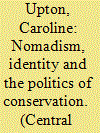

|
|
|
|
|
| Publication |
2010.
|
| Summary/Abstract |
This paper highlights the continuing importance of nomadism as an aspect of identity in contemporary Mongolia, and one which retains strategic, discursive and material resonance at diverse scales. It examines the contested representations and practices of nomadism with particular reference to conservation and to relations with land and nature. At a national level, nomadism remains a powerful, albeit romanticized, symbol of collective identity, often deployed, for example by urban elites with reference to a 'glorious past' (Bruun 2006). At the same time emergent urban identities are increasingly important in informing national self-representations of Mongolia, while contemporary nomadic herders are subject to contrasting discursive portrayals in mainstream conservation debates and policies. Particular concepts of relations with nature, including re-emergent spiritual dimensions, are highlighted as aspects of nomadic identity and practice at local levels, and their contrasts to and accommodation with donor-driven conservation projects explored. Finally, the paper highlights the emergent Global Pastoralists' movement as an important arena wherein Mongolian pastoralists can begin to deploy their own discursive representations of contemporary nomadic identities.
|
|
|
|
|
|
|
|
|
|
|
|
|
|
|
|
|
|
|
|
|